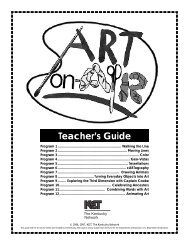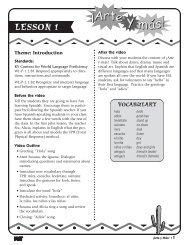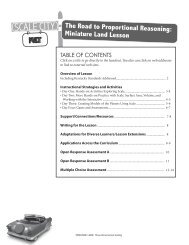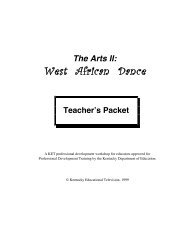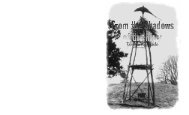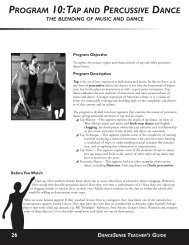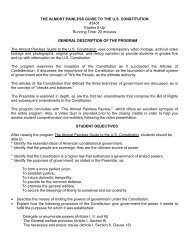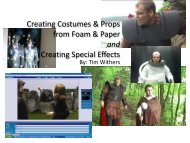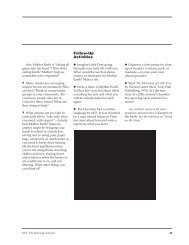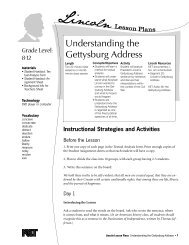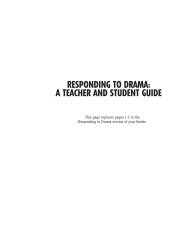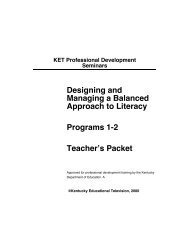7369 old music 2402 - KET
7369 old music 2402 - KET
7369 old music 2402 - KET
You also want an ePaper? Increase the reach of your titles
YUMPU automatically turns print PDFs into web optimized ePapers that Google loves.
Ideas for the<br />
Classroom<br />
Here are some activities that can be<br />
used in conjunction with any Old Music<br />
program. Select one or two to conduct<br />
with your students before or after you<br />
watch a program. If you need some<br />
expert help or additional ideas, contact<br />
your school’s <strong>music</strong> teacher or a<br />
community or student <strong>music</strong>ian.<br />
What Music Do You Like?<br />
Have students create and conduct a<br />
survey of classmates’ personal <strong>music</strong><br />
preferences. In the follow-up discussion,<br />
ask your students whether they<br />
listen to more than one kind of <strong>music</strong>.<br />
What is it they like about the <strong>music</strong><br />
they listen to? Does it make them want<br />
to sing? To move or dance? Does it say<br />
something to them? Do their parents,<br />
grandparents, and <strong>old</strong>er brothers and<br />
sisters listen to the same kind of <strong>music</strong><br />
or different kinds? What kind of <strong>music</strong><br />
do they expect to hear on a show called<br />
Old Music for New Ears?<br />
Continuing the Tradition<br />
Most of the songs featured in Old<br />
Music for New Ears are traditional<br />
songs, handed down from one generation<br />
to the next. No one knows exactly<br />
who composed many of them. Many of<br />
the performers tell how they learned the<br />
songs they sing or where the songs<br />
probably came from. For example,<br />
Mike Seeger says that “Derby Ram”<br />
(Program 5) is an <strong>old</strong> English-American<br />
song “reputed to be one of George<br />
Washington’s favorites.” Mike learned<br />
the version he sings in the program<br />
when he was about 12.<br />
Traditional songs such as “Derby<br />
Ram” may be new to students, but<br />
some of the songs they will have heard<br />
before. Students may find a tune<br />
familiar but not the words, or they may<br />
know different words or additional<br />
verses. Ask students to let the class<br />
know when they hear a song or tune<br />
they know and to share any different<br />
versions.<br />
A Class “Old Music” Songbook<br />
What songs have been passed down<br />
in your students’ families? Maybe they<br />
sing songs when their families get<br />
together for holiday celebrations or<br />
other family events. Perhaps they begin<br />
impromptu sing-alongs in the car to<br />
pass the time as they are driving to a<br />
vacation spot. Ask students to talk with<br />
their parents and grandparents about<br />
favorite family songs and to teach a<br />
favorite family song to the class. Point<br />
out that they are continuing the<br />
tradition of passing along and preserving<br />
this <strong>music</strong>. Have your students<br />
collect the songs, with the stories that<br />
accompany them, and organize this<br />
material into your own “<strong>old</strong> <strong>music</strong>”<br />
songbook.<br />
Adding Verses<br />
Traditional songs often change as<br />
they are passed down. “Some singers<br />
tried to sing them exactly as they<br />
learned them,” says Mike Seeger, “and<br />
others would change the melody a little<br />
and add or subtract a verse to suit<br />
themselves.” Select a song such as<br />
“Cluck Old Hen” (Program 5), “Go<br />
Rabbit” (Program 13), or “I Had a<br />
Bird” (Program 16) and ask students,<br />
individually or in groups, to add their<br />
own made-up verses.<br />
Malcolm Dalglish shows you<br />
another way to do this in Program 16<br />
when he performs a verse he added to a<br />
nursery rhyme. Adding verses to<br />
common nursery rhymes is an easy way<br />
to get started.<br />
Add the new verses to your class<br />
songbook.<br />
Traditional Instruments<br />
The Old Music performers play a<br />
variety of traditional instruments, some<br />
of which may be unfamiliar to students.<br />
Malcolm introduces them to the<br />
hammer dulcimer in the first program.<br />
Who else plays the hammer dulcimer in<br />
the series? What is this instrument’s<br />
“story”; i.e., where did it come from?<br />
What other instruments are similar?<br />
What does it look like? How is it<br />
played?<br />
Some of the <strong>music</strong>ians tell students<br />
about their instruments. For other<br />
instruments, students may be curious<br />
enough about them to research their<br />
origins and history. Keep an ongoing<br />
<strong>KET</strong>, The Kentucky Network 9



